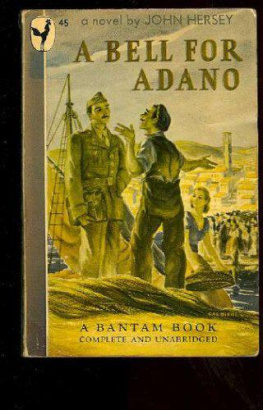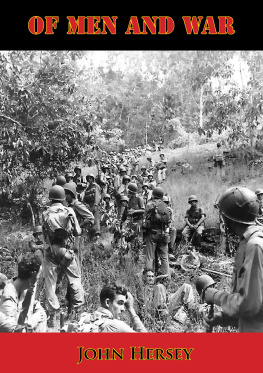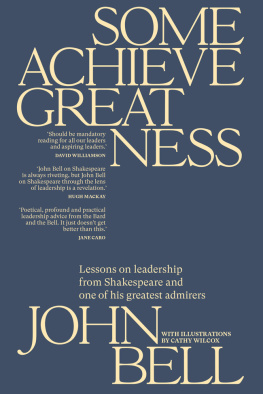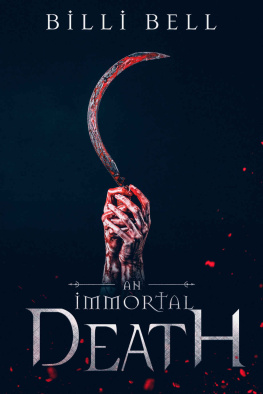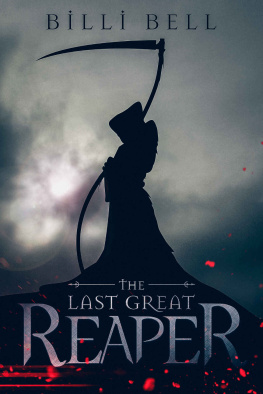John Hersey - A Bell for Adano
Here you can read online John Hersey - A Bell for Adano full text of the book (entire story) in english for free. Download pdf and epub, get meaning, cover and reviews about this ebook. year: 1944, genre: Detective and thriller. Description of the work, (preface) as well as reviews are available. Best literature library LitArk.com created for fans of good reading and offers a wide selection of genres:
Romance novel
Science fiction
Adventure
Detective
Science
History
Home and family
Prose
Art
Politics
Computer
Non-fiction
Religion
Business
Children
Humor
Choose a favorite category and find really read worthwhile books. Enjoy immersion in the world of imagination, feel the emotions of the characters or learn something new for yourself, make an fascinating discovery.
- Book:A Bell for Adano
- Author:
- Genre:
- Year:1944
- Rating:4 / 5
- Favourites:Add to favourites
- Your mark:
- 80
- 1
- 2
- 3
- 4
- 5
A Bell for Adano: summary, description and annotation
We offer to read an annotation, description, summary or preface (depends on what the author of the book "A Bell for Adano" wrote himself). If you haven't found the necessary information about the book — write in the comments, we will try to find it.
A Bell for Adano — read online for free the complete book (whole text) full work
Below is the text of the book, divided by pages. System saving the place of the last page read, allows you to conveniently read the book "A Bell for Adano" online for free, without having to search again every time where you left off. Put a bookmark, and you can go to the page where you finished reading at any time.
Font size:
Interval:
Bookmark:
A Bell For Adano
By John Hersey
Foreword
MAJOR VICTOR JOPPOLO, U.S.A., WAS A GOOD man. You will see that. It is the whole reason why I want you to know his story.
He was the Amgot officer o f a small Italian town called Adano. He was more or less the American mayor after our invasion.
Amgot, as you know, stood for Allied Military Government Occupied Territory. The authorities decided, shortly after the happenings o f this story, that the word Amgot had an ugly Germanic sound, and they heard that the two syllables of the word, when taken separately, were the Turkish words for the male and female genital organs. So they decided to call it A.M.G. and forget about the Occupied Territory.
That was later, though. When I knew him, Major Jop- polo was Amgot officer o f Adano, and he was good. There were probably not any really bad men in Amgot, but there were some stupid ones (and still are, even though the Turkish embarrassment has been taken care of). You see, the theories about administering occupied territories all turned out to be just theories, and in fact the thing which determined whether we Americans would be successful in that toughest o f all jobs was nothing more or less than the quality of the men who did the administering.
That is why I think it is important for you to know about Major Joppolo. He was a good man, though weak in certain attractive, human ways, and what he did and what he was not able to do in Adano represented in miniature what America can and cannot do in Europe. Since he happened to be a good man, his works represented the best o f the possibilities.
America is the international country. Major Joppolo was an Italian-American going to work in Italy. Our Army has Yugoslavs and Frenchmen and Austrians and Czechs and Norwegians in it, and everywhere our Army goes in Europe, a man can turn to the private beside him and say: Hey, Mac, whats this f furriner saying? How much does he want for that bunch o f grapes? And Mac will be able to translate.
That is where we are lucky. No other country has such a fund o f men who speak the languages o f the lands we must invade, who understand the ways and have listened to their parents sing the folk songs and have tasted the wine o f the land on the palate o f their memories. This is a lucky thing for America. We are very lucky to have our Joppolos. It is another reason why I think you should know the story o f this particular Joppolo.
America is on its way into Europe. You can be as isolationist as you want to be, but there is a fact. Our armies are on their way in. Just as truly as Europe once invaded us, with wave after wave o f immigrants, now we are invading Europe, with wave after wave o f sons o f immigrants.
Until there is a seeming stability in Europe, our armies and our after-armies will have to stay in Europe. Each American who stays may very well be extremely dependent on a Joppolo, not only for language, but for wisdom and justice and the other things we think we have to offer Europeans.
Therefore I beg you to get to know this man Joppolo well. We have need o f him. He is our future in the world. Neither the eloquence of Churchill nor the humaneness o f Roosevelt, no Charter, no four freedoms or fourteen points, no dreamers diagram so symmetrical and so faultless on paper, no plan, no hope, no treaty -none of these things can guarantee anything. Only men can guarantee, only the behavior o f men under pressure, only our Joppolos.
Chapter
INVASION had come to the town of Adano.
An American corporal ran tautly along the dirty Via Favemi and at the corner he threw himself down. He made certain arrangements with his light machine gun and then turned and beckoned to his friends to come forward.
In the Via Calabria, in another part of town, a party of three crept forward like cats. An explosion, possibly of a mortar shell, at some distance to the north but apparently inside the town, caused them to fall flat with a splash of dust. They waited on their bellies to see what would happen.
An entire platoon ducked from grave to grave in the Capucin Cemetery high on the hill overlooking town. The entire platoon was scared. They were out of touch with their unit. They did not know the situation. They were near their objective, which was the rocky crest not far off, but they wanted to find out what was going on in the town before they moved on.
All through the town of Adano, Americans were like this. They were not getting much resistance, but it was their first day of invasion, and they were tight in their muscles.
But at one of the sulphur loading jetties at the port a Major with a brief case under his arm stepped from the sliding gangway of LCI No. 9488, and he seemed to be wholly calm.
Borth, he said to the sergeant who followed him onto the jetty, this is like coming home, how often I have dreamed this. And he bent over and touched the palm of his hand to the jetty, then dusted his palm off on his woolen pants.
This man was Major Victor Joppolo, who had been named senior civil affairs officer of the town of Adano, representing Amgot. He was a man of medium height, with the dark skin of his parents, who were Italians from near Florence. He had a mustache. His face was round and his cheeks seemed cheerful but his eyes were intense and serious. He was about thirty-five.
The sergeant with him was Leonard Borth, an M.P., who was to be in charge of matters of security in Adano: he was to help weed out the bad Italians and make use of the good ones. Borth had volunteered to be the first to go into the town with the Major. Borth had no fear; he cared about nothing. He was of Hungarian parentage, and he had lived many places - in Budapest, where he had taken pre-medical studies, in Rome, where he had been a correspondent for Pester Lloyd, in Vienna, where he had worked in a travel agency, in Marseille, where he had been secretary to a rich exporter, in Boston, where he had been a reporter for the Herald, and in San Francisco, where he sold radios. Still he was less than thirty. He was an American citizen and an enlisted man by choice. To him the whole war was a cynical joke, and he considered his job in the war to make people take themselves less seriously.
When the Major touched Italian soil, Borth said: You are too sentimental.
The Major said: Maybe, but you will be the same when you get to Hungary.
Never, not me.
The Major looked toward the town and said; Do you think its safe now?
Borth said: Why not? Then how do we go?
Borth unfolded a map case deliberately. He put a freckled finger on the celluloid cover and said: Here, by the Via Barrino as far as the Via of October Twenty-eight, and the Piazza is at the top of the Via of October Twenty-eight.
October Twenty-eight, the Major said, what is that, October Twenty-eight?
Thats the date of Mussolinis march on Rome, in 1922, Borth said. It is the day when Mussolini thinks he began to be a big shot. Borth was very good at memory.
They started walking. The Major said: I have lost all count, so what is today?
July tenth.
We will call it the Via of July Ten.
So youre renaming the streets already. Next youll be raising monuments, Major Joppolo, first to an unknown soldier, then to yourself. I dont trust you men who are so sentimental and have too damn much conscience.
Cut the kidding, the Major said. There was an echo in the way he said it, as if he were a boy having been called wop by others in school. In spite of the gold maple leaf of rank on the collar, there was an echo.
The two men walked up the Via Barrino. There was nobody in the street. All the people had either fled to the hills or were hiding in bomb shelters and cellars. The houses of this street were poor grey affairs, two-storey houses of grey brick, with grey shutters, all dusted over with grey dust which had been thrown up from bomb craters and shell holes. Here and there, where a house had been hit, grey bricks had cascaded into the grey street.
Font size:
Interval:
Bookmark:
Similar books «A Bell for Adano»
Look at similar books to A Bell for Adano. We have selected literature similar in name and meaning in the hope of providing readers with more options to find new, interesting, not yet read works.
Discussion, reviews of the book A Bell for Adano and just readers' own opinions. Leave your comments, write what you think about the work, its meaning or the main characters. Specify what exactly you liked and what you didn't like, and why you think so.

